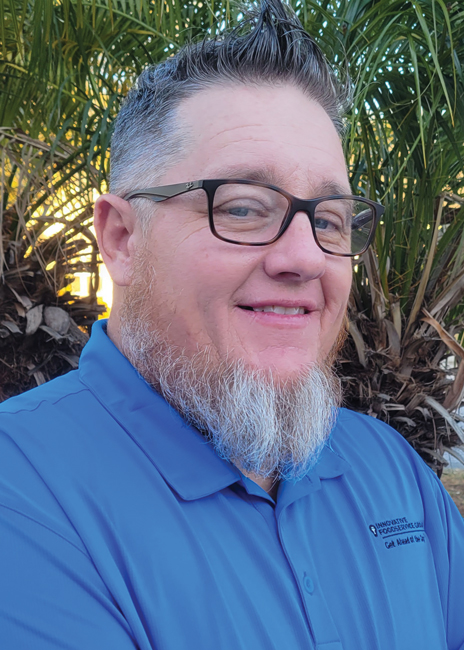Scott Hall, Innovative Foodservice Group
 Scott Hall spent 20 years working on the operations side of the foodservice industry before becoming a dealer sales rep back in 2016. While he may have switched roles, Hall’s background as a chef and owner continues to serve as the foundation for his current role as national sales account executive for Innovative Foodservice Group. “I am seasoned, as some people like to say. I have a lot of experience in a lot of different areas,” Hall says. “What I bring to the table the most is knowing all aspects of the business.”
Scott Hall spent 20 years working on the operations side of the foodservice industry before becoming a dealer sales rep back in 2016. While he may have switched roles, Hall’s background as a chef and owner continues to serve as the foundation for his current role as national sales account executive for Innovative Foodservice Group. “I am seasoned, as some people like to say. I have a lot of experience in a lot of different areas,” Hall says. “What I bring to the table the most is knowing all aspects of the business.”
His current book of business includes chains, contract feeders and even a few healthcare foodservice operators. Here, Hall discusses the evolving role of foodservice technology, his approach to problem-solving and more.
Q: How has kitchen technology developed over the course of your career?
A: The technology that’s being developed in today’s kitchen equipment is amazing. With a combi oven, for example, you can program it and operate it from your home or office or your phone. The applications for one piece of equipment have expanded dramatically. It used to be to cook bacon to a crispy state it would take 14 minutes. With the technology out there today, we can cut that in half. If I was using a piece of equipment like this when I was an operator, I could have eliminated two people, and with today’s labor concerns that’s important.
Q: Saving labor is top of mind for your customers at the moment, isn’t it?
A: In our market people don’t ask about what’s new at the moment. They ask if you know someone they can hire as a cook. So, any labor-saving features are important because operators are looking to save time and make their businesses more efficient with less people. I am working with a chain that’s looking to shrink the footprint of its kitchen to make it easier to work with fewer people. You do that by removing steps and automating certain tasks, which, yes, can include robotics. My wife always tells me the movie “The Matrix” is real, and she’s right. Ten years ago, if you said there would be a robot as a server, people would have rolled their eyes. Today it’s happening here in Florida. People may find the cost to be prohibitive but look at the return on investment. It’s there.
Q: Sometimes things can get hectic and even intense in kitchens. How does your experience working in tight situations help you navigate these challenges?
A: When I see a chef that’s panicking or needs a fix for something, I have a sense for what that person is going through. I think of what’s available out there and what might be available now and in six months and try to present that in the best way to the chef. Having knowledge of the actual application really helps. The chef may want a salamander but a cheese melter will do. You don’t want to sell them something they don’t need. It’s best to just be honest and up front. Anything less does not help the situation. You place the operator in a predicament because they think they have a solution when they do not.
Q: How do you handle things that go wrong?
A: The relationships you have with your factories and your reps will make you or break you in this business. You have to treat people the way you want to be treated. We had pole for a shelving unit show up bent the other day, and I called the rep who came down and fixed it himself. If you have great relationships, you have great results.
DSR 3-2-1
Scott Hall, Innovative Foodservice Group, sits down with Jason Wange, Foodservice Powerplant Network, to talk about being named an FE&S DSR of the Month.
Find more episodes of DSR 3-2-1 here.
Foodservice Equipment & Supplies Presents DSR 3-2-1 is sponsored by Salvajor.



